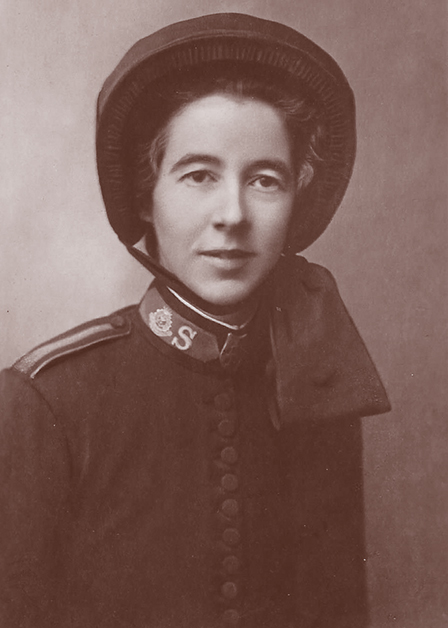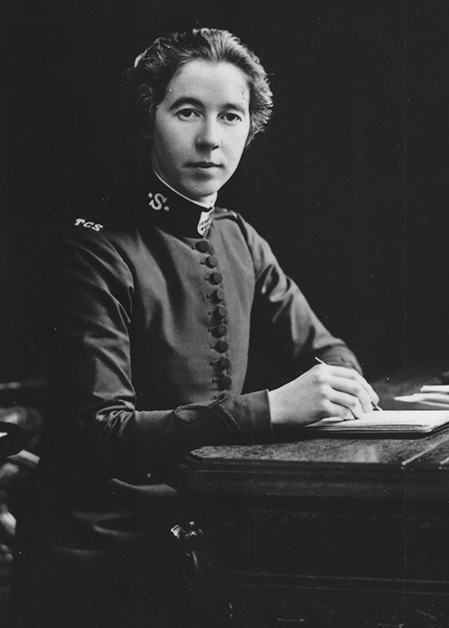Remembering Catherine Bramwell-Booth
Imagine living a full and interesting life, retiring and then in your 90s becoming a beloved celebrity. This was the case for Catherine Bramwell-Booth.Imagine living a full and interesting life, retiring and then in your 90s becoming a beloved celebrity. This was the case for the granddaughter of The Salvation Army’s Founders, William and Catherine Booth. Her name was Catherine Bramwell-Booth.

She was born in 1883 and lived to be 104 years old. Her parents were Bramwell and Florence Booth. Her “Promotion to Glory” in 1987 was heralded as the end of an era and was reported internationally. She had fond recollections of her grandparents but mainly spent her adult life trying to maintain and resurrect her father’s enduring legacy.
Catherine was sworn in as a soldier at the age of 15. Although naturally shy, she responded to the call to officership at age 19. After commissioning, she was given several different appointments, mainly in evangelical work. In 1904, she was asked to join the General on one of his motorcades through Britain.
For the next 10 years, she was appointed to the International Training College, then in Clapton, London. She was known for her sense of humor and her individual care of cadets. While at the training college in 1913, she was asked to speak in Russia.
In 1926, she was promoted to Colonel and given the immense task of leading the social work among women in Britain. Her work and diligence brought a further promotion to Commissioner in 1927. For the next 19 years, she remained the officer in charge of women’s social work. Her work was especially praised during World War II, as the east end of London was bombed repeatedly during what has been called “the Blitz.” In 1945 she was promoted to International Secretary for Europe and remained in that post until her retirement in 1948.
Catherine Bramwell-Booth was in attendance at the 1929 High Council and argued fervently for the commissioners to retain her father as General. She was the “eyes and ears” of the General and made the daily trip to consult with her mother and father at a small villa nearby. Given the chance to speak and defend her father, she arose at 9:30 p.m. after a very long day. She held the floor for an hour and 37 minutes. Her impassioned pleas and overview of her father’s time as General was heard, but few changed their minds.

It was generally thought and accepted that Catherine was her father’s chosen successor. Dr. Roger Green and others believe that her name was the one in the sealed envelope. After the High Council elected Edward Higgins as General, that envelope was burned by the Army’s solicitor. When her father was “Promoted to Glory” in June, some of the family believed that their arguments were justified and that the High Council should have waited. Catherine legally added “Bramwell” to her name in 1930 as a tribute to her father.
In retirement, she authored several books. Her two best known works are biographies of her grandmother, Catherine Mumford, and her father. For many years, she lived a peaceful life in retirement. In 1971, she was made a Commander of the British Empire and in 1983 was given the Army’s highest award, the Order of the Founder.
Catherine Bramwell-Booth had an engaging personality and many people wanted to know more about the Army’s early days. She gained a following when she appeared on several television shows, radio broadcasts and documentary programs.
Catherine Bramwell-Booth left an endearing legacy as several of her filmed appearances are now available on the internet. However, it would have changed the Army if she would have been selected as General after her father’s death. She would have been in office from June 1929 until October 1987, a period of 58 years!
For more information on Catherine Bramwell-Booth, check out the following resources:
- Batchelor, Mary: Catherine Bramwell-Booth Pub. by Lion, 1986.
- Swift, Catherine M.: Catherine Bramwell-Booth Pub. by Marshall Pickering, 1989.
- Larsson, John: 1929: A crisis that shaped The Salvation Army’s future Pub. By Salvation Books, 2009.







